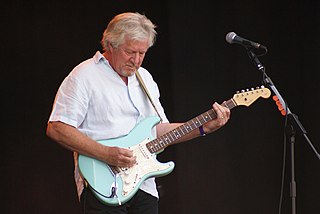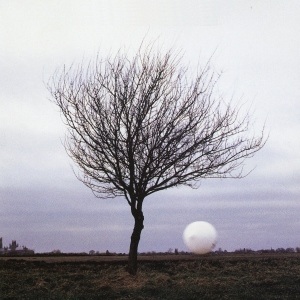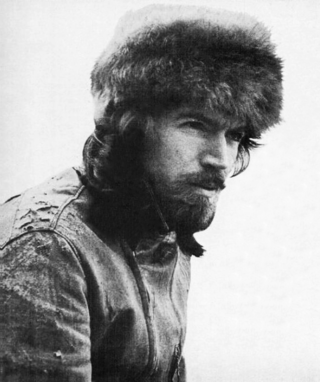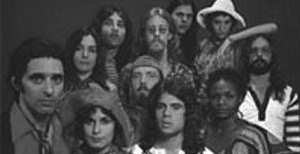
Larry Graham Jr. is an American bassist and baritone singer, with the psychedelic soul/funk band Sly and the Family Stone and as the founder and frontman of Graham Central Station. In 1980, he released the single "One in a Million You", which reached the top ten on the US Billboard Hot 100. He is credited with the invention of the slapping technique on the electric bass guitar, which radically expanded the tonal palette of the bass, although he himself refers to the technique as "thumpin' and pluckin'".
All About Eve were an English rock band. The initial creative core consisted of Coventry-born Julianne Regan (vocals), Huddersfield-born Tim Bricheno (guitar) and Andy Cousin, with other members changing over the years. Their highest-charting UK single was "Martha's Harbour" (1988). The band was active from 1984 to 1993, then 1999 to 2004, achieving four UK Top-50 albums. The band had been recognised for their "unique, folk-rock-influenced take" on the gothic rock style, and Regan has been described as "certainly one of the more talented singers" of the scene in the late 1980s.

William H. Payne is an American pianist who, with Lowell George, co-founded the American rock band Little Feat. He is considered by many other rock pianists, including Elton John, to be one of the finest American piano rock and blues musicians. In addition to his trademark barrelhouse blues piano, he is noted for his work on the Hammond B3 organ. Payne is an accomplished songwriter whose credits include "Oh, Atlanta". Following the death of Little Feat drummer Richie Hayward on August 12, 2010, Payne is the only member of the group from the original four-piece line-up currently playing in the band.

Montrose was an American hard rock band formed in 1973 and named after guitarist and founder Ronnie Montrose. The band's original lineup featured lead vocalist and frontman Sammy Hagar, who later found greater success as a solo artist and as a member of Van Halen. Rounding out the original foursome were bassist Bill Church and drummer Denny Carmassi. The band experienced moderate success before disbanding in early 1977. The 1973 debut album Montrose eventually proved to be an international sleeper hit, selling in excess of one million copies and attaining platinum status in 1986.

Lee Mack Ritenour is an American jazz guitarist who has been active since the late 1960s.

Maria Muldaur is an American folk and blues singer who was part of the American folk music revival in the early 1960s. She recorded the 1973 hit song "Midnight at the Oasis" and has recorded albums in the folk, blues, early jazz, gospel, country, and R&B traditions.

Timothy John Pearson Renwick is an English guitarist. He is best known for his association with Al Stewart in his early career and for his long-standing role as lead guitarist for the Sutherland Brothers & Quiver. His single "Dark Island" peaked at number 80 in Australia in 1980.

Highway 101 was an American country music band founded in 1986 in Los Angeles, California. The initial lineup consisted of Paulette Carlson, Jack Daniels (guitar), Curtis Stone, and Scott "Cactus" Moser (drums). Prior to the band's founding, Carlson was a solo artist. With her as lead vocalist, the band recorded three albums for Warner Bros. Records Nashville. After Carlson left in 1990 to pursue a solo career, the band recorded a fourth album for Warner with Nikki Nelson on lead vocals before exiting the label. One album each followed on Liberty, Intersound, and Free Falls Records under various lineups.
Medicine Head were a British blues rock band – initially a duo – active in the 1970s. Their biggest single success was in 1973 with "One and One Is One", which reached number 3 on the UK Singles Chart. The group recorded six original albums, the first three of which were released by John Peel's Dandelion label.

"Take It Back" is a song by the progressive rock band Pink Floyd, released as the seventh track on their 1994 album The Division Bell. It was also released as a single on 16 May 1994, the first from the album, and Pink Floyd's first for seven years. The single peaked at number 23 on the UK Singles Chart, the fourth highest in the band's history, below 1979 number 1 hit "Another Brick In The Wall" and 1967 top 20 hits "See Emily Play" and "Arnold Layne." The music for the song was written by guitarist David Gilmour and album co-producer Bob Ezrin, with lyrics by Gilmour, his wife Polly Samson and Nick Laird-Clowes.

The Sutherland Brothers were a Scottish folk and soft rock duo. From 1973 to 1978, they performed with rock band Quiver, and recorded and toured as Sutherland Brothers & Quiver. Under this combined moniker, the group recorded several albums and had a significant international hit single with the song "Arms of Mary" in 1976. In North America, they are primarily known for their 1973 single "(I Don't Want to Love You But) You Got Me Anyway".

Greenslade were an English progressive rock band, formed in the autumn of 1972 by keyboard player Dave Greenslade and bassist Tony Reeves, with keyboardist Dave Lawson and drummer Andrew McCulloch.

James Cregan is an English rock guitarist and bassist, best known for his associations with Family, Steve Harley & Cockney Rebel, and Rod Stewart. Cregan is a former husband of the singer Linda Lewis and worked with her as a record producer. He has also worked with The Quireboys, Glass Tiger, Katie Melua and formed Farm Dogs with Bernie Taupin.
Humpy Bong were an English folk rock band formed in London in 1970, by former Bee Gees drummer Colin Petersen and Irish folk rock singer Jonathan Kelly.

"How Long" is the debut single by the English band Ace, from their 1974 debut album, Five-A-Side. It reached No. 3 on both the US and Canadian charts, and No. 20 on the UK Singles Chart.

Danny O'Keefe is an American folk singer and songwriter.

Stoneground was an American rock band formed in 1970 in Concord, California. Originally a trio, Stoneground expanded to a 10-piece band by the time of their eponymous 1971 debut album. The group appeared in two films, Medicine Ball Caravan (1971) and Dracula A.D. 1972 (1972), and released three albums before singer Sal Valentino quit in 1973. Three other band members—Cory Lerios, Steve Price and David Jenkins—left to form pop group Pablo Cruise. Stoneground continued as an act through 1982, with only Tim Barnes and Annie Sampson remaining from the early incarnation of the band. Barnes and Price led a re-formed Stoneground in 2003 and released a studio album the following year.
"Arms of Mary" is a song written by Iain Sutherland and performed by Sutherland Brothers and Quiver. It was a 1976 international hit single for the band; the Glasgow Herald in its obituary for Iain Sutherland described "Arms of Mary" as "a plaintive and radio-friendly folk-rock ballad in which the narrator reminisces over the woman he first made love to."
Junior's Eyes was a British group led by guitarist Mick Wayne, which recorded one album and is notable for acting as David Bowie's backing band during 1969.
Willie Wilson is an English rock drummer, known for his work with Pink Floyd and his long-time association with their guitarist, David Gilmour.














